
Jamiroquai are an English funk and acid jazz band from London. Formed in 1992, they are fronted by vocalist Jay Kay, and were prominent in the London-based funk and acid jazz movement of the 1990s. They built on their acid jazz sound in their early releases and later drew from rock, disco, electronic and Latin music genres. Lyrically, the group has addressed social and environmental justice. Kay has remained as the only original member through several line-up changes.
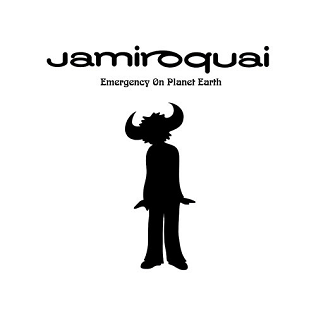
Emergency on Planet Earth is the debut studio album by English funk and acid jazz band Jamiroquai, released on 14 June 1993 under Sony Soho Square. Prior its release, the band debuted in 1992 with "When You Gonna Learn" under Acid Jazz Records, and front-man Jay Kay was given a major-label deal with Sony Music. The album was produced as Kay formed the band and is characterised by its acid jazz foundations, layers of instrumentation and socially charged lyrics.

The Return of the Space Cowboy is the second album by English funk and acid jazz band Jamiroquai. The album was released on 17 October 1994 under Sony Soho Square. The album continues the musical direction of their debut, Emergency on Planet Earth (1993), and is characterised by its complex songwriting as a result of Jay Kay's creative block mid-production. Its lyrics addressed street life, hope, loss, Kay's drug use, and social matters regarding Native Americans and youth protests.

Travelling Without Moving is the third studio album by English funk and acid jazz band Jamiroquai, released on 28 August 1996 in Japan, then on 9 September 1996 in the United Kingdom under Sony Soho Square. Front-man Jay Kay intended for the album to have a more universal style, revolving around "cars, life and love". Critics have generally praised the album for being more focused and refined than the band's previous work while others panned its lyrics and found the album too derivative. Kay also faced backlash from the press for his use of sports cars in this period despite his environmental beliefs.

"Feels Just Like It Should" is the first single from British funk and acid jazz band Jamiroquai's sixth studio album, Dynamite (2005). Mike Spencer and Jay Kay produced the song. The track was built on a bass line created by Kay as a human beatbox. This bassline initially formed part of an interlude intended to feature on the band's 2001 album, A Funk Odyssey. Still, it was dropped for the album's final version, only appearing on the test pressing. The song was their fourth number-one on the US Dance Chart and peaked at eight on the UK Singles Chart. It was nominated for a Grammy Award for Best Short Form Music Video at the 48th Grammy Awards.

"Virtual Insanity" is a song by British funk band Jamiroquai, released on 19 August 1996 as the second single from their third studio album, Travelling Without Moving (1996). The song interpolates parts of Jocelyn Brown's post-disco hit "Somebody Else's Guy" (1984), and its award-winning music video was released in September 1996, garnering ten nominations and winning four, including for "Video of the Year", at the 1997 MTV Video Music Awards.

"Cosmic Girl" is the second single from British funk and acid jazz band Jamiroquai's third studio album, Travelling Without Moving (1996). The song was released in the United Kingdom on 25 November 1996 via Sony Soho Square and in the United States in 1997 via Work Group. It achieved great chart success, peaking at No. 6 on the UK Singles Chart. The song also reached No. 3 in Italy, No. 4 in Iceland, and No. 10 in Finland. The accompanying music video was directed by Adrian Moat and filmed in Spain. The B-side to the single is an instrumental, "Slipin' 'N' Slidin'", a song originating from another Jamiroquai track called "Mr Boogie", which was a live-only song. "Slipin 'N' Slidin'", just like "Mr Boogie", also has a vocal version.
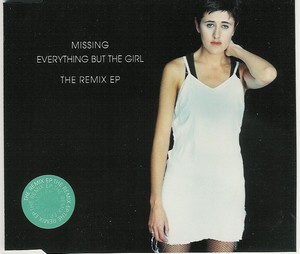
"Missing" is a song by English musical duo Everything but the Girl, taken from their eighth studio album, Amplified Heart (1994). It was written by the two band members, Tracey Thorn and Ben Watt, and was produced by Watt and John Coxon. It was taken as the second single off the album on 8 August 1994 by Blanco y Negro Records in the United Kingdom and by Atlantic Records in the United States. It initially did not achieve much success until it was remixed by Todd Terry and re-released in 1995, resulting in worldwide success, peaking at or near the top of the charts in many countries. The release of the remixed version of "Missing" gave an indication of the band's future experimentation with more electronic dance music on subsequent albums.

High Times: Singles 1992–2006 is a compilation album by the British band Jamiroquai that was released on 6 November 2006 in the United Kingdom and 8 November 2006 in Japan.
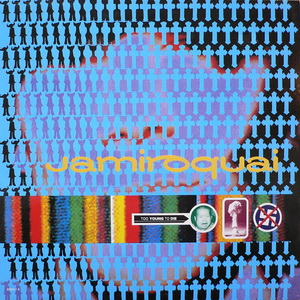
"Too Young to Die" is a song by British funk and acid jazz band Jamiroquai, released in March 1993 as the second single from their debut studio album, Emergency on Planet Earth (1993). The original version of the track runs at 10:18; however, both the single and album versions were cut, running at 3:22 and 6:05, respectively. The single received positive reviews from music critics, who compared lead singer Jay Kay to Stevie Wonder.

"Little L" is the lead single from British funk and acid jazz band Jamiroquai's fifth studio album, A Funk Odyssey (2001). The song was written by Jay Kay and Toby Smith and was inspired by the break-up between Kay and his former girlfriend Denise van Outen, which occurred due to conflicting work commitments and which led to Kay's cocaine problem. Kay quit his habit in 2003.

"King for a Day" is the fourth single from British funk and acid jazz band Jamiroquai's fourth studio album, Synkronized (1999). The song was written by Jay Kay and is a "tribute" to bassist Stuart Zender, who left the band shortly before Synkronized was completed. Jay Kay subsequently rerecorded all the songs on the album without Zender, and added "King for a Day" as the final track on the album. Upon its release on 29 November 1999, the song reached number 20 on the UK Singles Chart. The video features Jay Kay walking around an old mansion, where each room has a member of the band.

"Emergency on Planet Earth" is a song by British funk/acid jazz band Jamiroquai, released by Sony Soho Square as the fourth and final single from the band's debut studio album of the same name (1993). The song was written by Jay Kay, and has an environmentalist tone, urging the listener to "stop modernisation going on." The track peaked at number 14 on the UK Singles Chart and at number four on the US Dance Chart.

"Alright" is a song by British funk and acid jazz band Jamiroquai, released as the third single from their third studio album, Travelling Without Moving (1996). The song, written by Jamiroquai, contains samples from Eddie Harris' "It's All Right Now" and Idris Muhammad's "Could Heaven Ever Be Like This". "Alright" was released on 28 April 1997 via Sony Soho Square in the United Kingdom, peaking at number six on the UK Singles Chart and at number two in Iceland. It is the group's only single to chart on the US Billboard Hot 100, peaking at number 78. The music video, directed by Vaughan Arnell, features the band performing the song at a party.

"Light Years" is a song by the British funk and acid jazz band Jamiroquai, originally released in 1994 as a song from their second studio album, The Return of the Space Cowboy (1994). It was released as a single on 12 February 1995 by Sony Soho Square and Work, but failed to chart on the UK Singles Chart due to little promotion of the track.
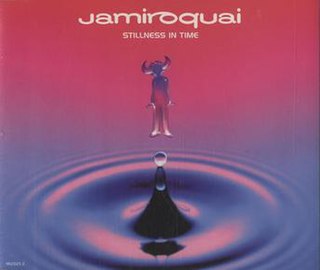
"Stillness in Time" is a song by British funk and acid jazz band Jamiroquai, released in 1994 on their second studio album, The Return of the Space Cowboy (1994), and the year after as a single by Sony Soho Square. The track was written by Jay Kay and Toby Smith, and peaked at number nine on the UK Singles Chart, making it the group's highest-charting release to that date. It also reached number one on the UK Dance Chart and number 14 in Scotland.

"Half the Man" is a song by British funk/acid jazz band Jamiroquai, released in November 1994 by S2 Records as a single from their second studio album, The Return of the Space Cowboy (1994). The song peaked at number 15 on the UK Singles Chart. Its music video was directed by Paul Boyd. "Half the Man" is in the key of D major.

"Blow Your Mind" is the third overall single to be released from British funk/acid jazz band Jamiroquai's debut studio album, Emergency on Planet Earth (1993). It was released on 24 May 1993 through Sony Soho Square in the United Kingdom, peaking at number 12 on the UK Singles Chart. The song's accompanying music video was directed by Vaughan Arnell and Anthea Benton.
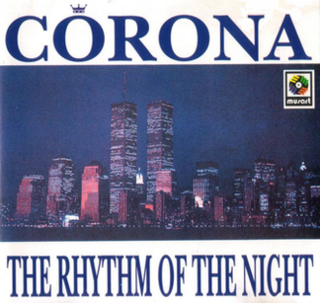
"The Rhythm of the Night" is a song by Italian Eurodance group Corona. It was released as their debut single in 1993 in Italy, then elsewhere the following year. The song is the title track of the group's debut studio album, The Rhythm of the Night (1995), and was written by Francesco Bontempi, Annerley Emma Gordon, Giorgio Spagna, Pete Glenister and Mike Gaffey. It was produced by Bontempi, and the vocals were performed by Italian singer Giovanna Bersola, who is not credited on the single and does not appear in the music video. The woman who appears in the video is the group's frontwoman Olga Souza. The video was A-listed on Music TV-channels, such as Germany's VIVA. The song was a worldwide hit in 1994, peaking at number-one in Italy, and within the top five in most of Europe, while in the US, it fell short of the top ten, reaching number eleven on both the Billboard Hot 100 and the Cash Box Top 100.
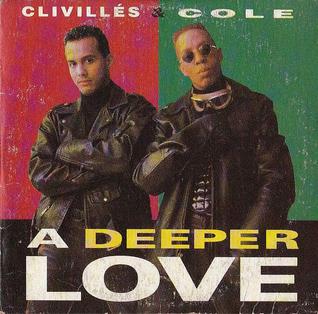
"A Deeper Love" is a song written by American producers Robert Clivillés and David Cole, and performed by them as Clivillés & Cole featuring vocals by Deborah Cooper. Released by Columbia in 1991, the song was the duo's fifth number-one on the US Billboard Hot Dance Club Play chart. On other US charts, "A Deeper Love" peaked at number 83 on the soul singles chart and number 44 on the pop chart. Overseas, especially in Europe the single charted higher, going to number 15 in the UK and number eight on the Dutch Top 40.




















